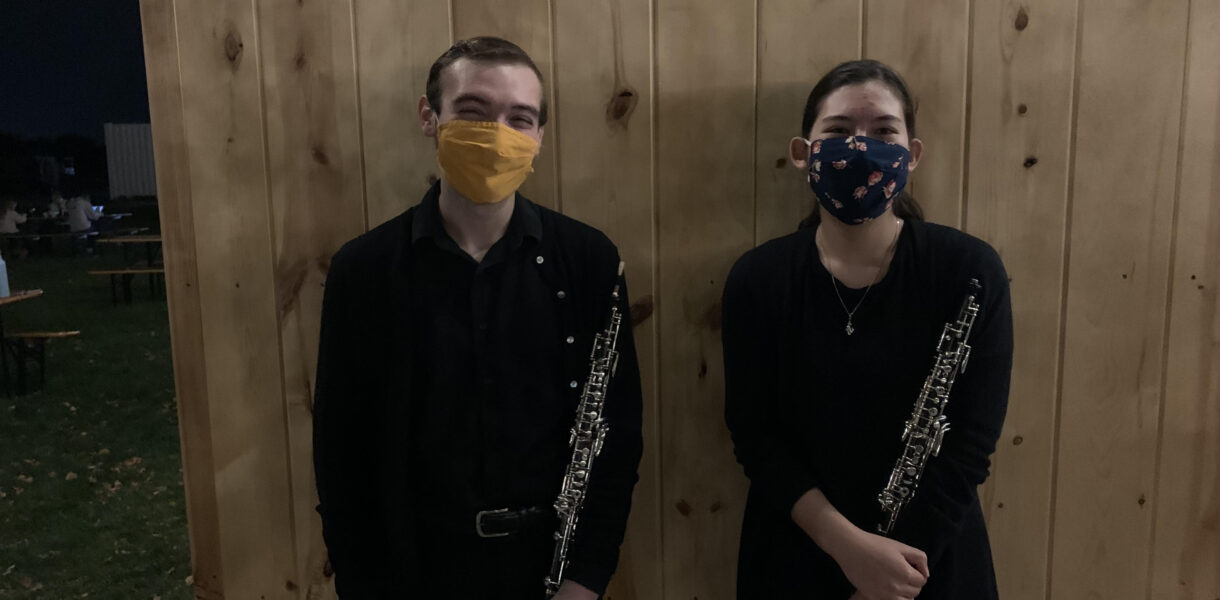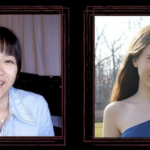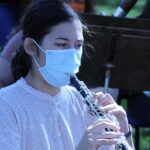If you asked me to name the most well-rounded musician I know, I would without a doubt say Katie Pierce.
A sophomore music education major at the University of Illinois at Urbana-Champaign, Katie has shown her commitment, talent, and drive time and time again. Her love for music and education are infectious. I chatted with Katie about what what her experience is like as a music major and who she draws inspiration from.
Katie, I got to know you from Lake Forest High School [where we both went to school] and now you’re a music education student at the University of Illinois … Can you tell us a bit about yourself?
Yeah, so, my name’s Katie Pierce, I’m a sophomore at UIUC, and I’m part of a very large group of sophomores in the music education department. We are part of the fine and applied arts school which is a subset of a music school, and then we have a music education school in that. I’m in my fourth semester of that, and outside of class I’m part of the Marching Illini. I was recently named alto saxophone music section leader for this next season, so I’m serving on student staff with our drum majors and other section leaders, which is really exciting! I’m also part of two outside clubs, we call them “registered student organizations” – one of them is the National Association for Music Education and that’s a student run chapter here on campus, and we do lots of professional development with choir ed majors, instrumental and technology and general music ed majors, so everyone’s in the mix. I’m also on the exec board of National Band Association of UIUC chapter, and I’m the vice president of that, and we’re loosely affiliated with the national chapter, and we’ll do playing in times of not covid and professional development events a lot during this semester – a lot of meeting and talks. It’s great for music educators, for future music educators, because we’re able to get some of our early field experience hours through those events, so we’re kinda hitting two birds with one stone. So, that’s what I do with most of my time!
Well, congratulations on section leader, that’s very exciting! And you play the oboe, right? You’re very involved with different types of music, whether it be classical, playing in band, you are in marching band of course, jazz I’ve heard you do before… so can you tell us about the instruments you play and the types of music you’ve had exposure to?
Yeah! So I’ve actually done a lot of different things here, the first one being alto saxophone, which I hadn’t picked up for two years since I was drum major at Lake Forest for two years so I didn’t play a lot. So, I’ve gotten really proficient at playing that instrument since we had to play it everyday 5 – 6 days a week for that entire first semester. And I’ve learned a lot and become really good at adapting to that kind of fingering, which is really similar to the oboe but not exactly the same. And it’s also helped me adapt to all the other instruments that I’ve learned; I’m taking clarinet right now and I took flute so those woodwind instruments have a lot of similarities with the saxophone. Learning those woodwind instruments has been very helpful and eye opening as an oboe player. And, also piano has helped SO much, and not for the reasons that many people think! We actually here use it as part of our ear training curriculum, so we have to do things called “Play and Sings” as our homework, where we are given a melody played by one or two hands in the piano and we have to sing along with it. And so that coordination, and being able to, and I’ve described to my professor before that I’ve taken piano since I was in kindergarten so I almost feel like I know it so well that it’s like another part of my body. I don’t have to think too hard about what I’m doing, and then if I’m listening to something and he’s asking us to write it down I can be like “Okay, how do I play this,” and then be able to write it into notation. And that’s what’s so cool about having that piano experience, and I’ve used it so much, in fingering and in ear training. And finally, for the oboe stuff, that’s a lot of my focus since all music ed majors here are part of the studio for whatever instrument they play. I’m with probably 80-85% performance majors in the oboe studio, we’re a studio of about 20 people, so most of those people are performance majors and we are held to the same standards. So we are playing excerpts every week, we perform twice a semester and have mock auditions as our final exams, and we have to play in an audition for placement in an ensemble every semester. And so that’s a lot of work, it’s a lot of playing! And the ensembles themselves are a lot. Last year, my freshman year, first semester I was in the wind orchestra, directed by Dr. Mrs. Peterson here, and she’s amazing. And that was a really cool experience. And then I was supposed to play with the Philharmonia Orchestra in the Spring until we got sent home, and then this year I’ve been in the Illinois Wind Symphony with Dr. Mr. Peterson! And that has been a challenge since it’s the top band and a lot of work.
Yes, you sound quite busy! And I always find it interesting to see, I mean, so many musicians focus on one thing, but having a wide range of opportunities and experiences really changes how you’ll be as a musician and as an educator. Actually, since you study music education; why did you choose to go into this?
I’ve had this inkling that I’ve wanted to do it since high school, or it might have been middle school, I think, actually. Everyone here says this so it’s almost a cliche, but it’s because I loved the teachers that I had. And it’s so true. Because Mr. Beese, my middle school’s band director, was something else, he was awesome. And I just was like, “Okay, I think I can do that,” but I just wasn’t really set on it yet, until I got to high school and Mrs. Kessler [my high school band director] solidified that for me and that experience. The thing I always tell people about how I knew I wanted to teach, and specifically knew I wanted to conduct, was when end of my sophomore year of high school we had auditions for drum major and we had to conduct the National Anthem. When I did that for the test, the actual thing, I thought, I know this is what I want to do for the rest of my life. Because this feeling – is just a feeling that you get. And it was challenging. The coursework is challenging, and a lot of people these first two years get burnout. Sometimes they switch majors. We’ve had people do that. Through it all, I’ve not wavered. This is what I want to do and I feel like if I was doing anything else I wouldn’t be enjoying myself. I’m uncovering new leaves everyday, it’s amazing! I’m learning so much.
So somewhat on a different topic, I just have to ask. As a pianist myself, I’m very intrigued by the idea of marching band, and moving with your instruments! Can you tell me what that experience is like?
Like, being in marching band?
How do you move with your instrument?! I’m very curious.
Let’s just say, I had no idea what I was going into until I got into it. In a normal year, we arrive a week early to school. So me, I’m not even a freshman yet, this is a week before I start freshman year, we go in and we are placed on that field and we are shadowing someone and we are just marching. They don’t tell you what’s going on, you just do it! And they’re like, “this is how you read this graph, that tells you exactly what to do,’ and no one understands it, and you’re just kinda thrown in, and you learn it. There’s a great organizational structure to all of it, and our director, Barry Houser, is amazing. I think being in his presence, he is so energetic and so organized. He has this hierarchy of leadership, it’s great. So we have him and a bunch of grad and doctoral students as staff. Then they have drum majors, and a student staff of section leaders, and working with section leaders in individual squads are squad leaders, and that’s the smallest group of people. We’re around 375 people, and each squad is around 5 people. And so in your squad you have a squad leader, and as a freshman you’re learning stuff and they’re making corrections: “Okay, do this, try this, do this,” and then we’ll do sectional time as a section where section leaders and squad leaders are working on you individually. So you really feel like you’re getting personal feedback on what you’re doing. Physically doing stuff with instruments – it took a while. And it took a lot of pain, physical pain. There’s a lot of back pain from the upper back stuff since I have to stand straight through all of our posture stuff that we’ve got to do, and in holding the weight. I had to wear a wrist brace of some sort on my right arm because that’s how I support the alto, and my wrist was hurting for a while. So, there is some getting used to the movements and things, and a lot of it’s not very natural. So a lot of the primary teachers of the instruments do not like the way we hold things, but it looks great! So that’s what we care about. But you get used to it. It’s just a lot of practice; they throw you in and you learn to swim.
That’s very cool to hear, because I feel like a lot of people see marching bands if they’re football fans and not musicians! I remember when I was younger, before I was really involved in music, I would go to football games and think, “Oh the marching band! It’s so cool!” But obviously there’s a ton of work that goes into preparing that that you don’t see, so I really enjoyed hearing that. Actually, do you have any stories specifically about the times you saw the power of not only music but music education?
With Mrs. Kessler, a lot of her focus is not necessarily on getting us to those state competitions, on getting us competing. She’s not making everyone go out for ILMEA [Illinois district and state ensembles], she’s not making everyone compete. You know, she pushes us to play our etudes and our scales, and we get really proficient and really good! But she’s so focused on the community. And I feel like that is inspiring. And our football season at Lake Forest High School is unlike any other high school, they practice every night of the week and then do the same show the whole quarter. And we were learning new music every week, it was exciting! We were not worried about looking a certain way or having everything tucked in right. We are ordering our food and looking forward to eating dinner together! And that way, it’s music. It’s the people thing that inspired me a lot. And she’s so good at that and so good at community. And she has really continued with that through the pandemic. I observed her for a couple of weeks in January, and she’s still keeping it alive and making it fun, and I just love that so much.
That’s so wonderful! So often we hear of music as a competitive thing, or it’s made out to be this, and I don’t think that’s the true purpose of music! I look up to the people who are able to make something different out of it.
If you enjoyed this article, make sure to check out the second part where Katie tells me about how music educators are working to diversify the music field.



